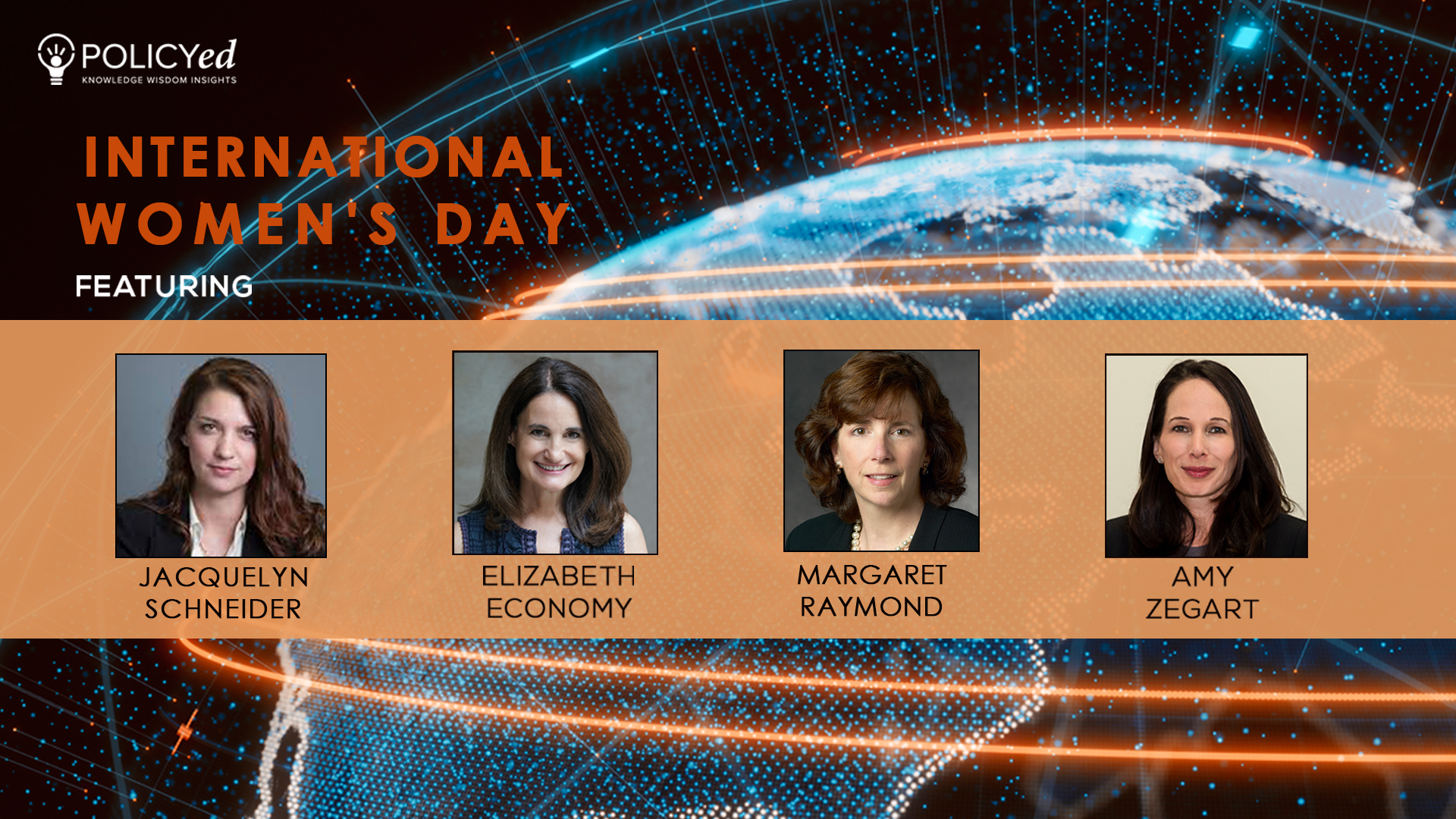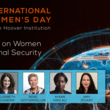International Women’s Day
Written by Kanza F. Naqvi

International Women’s Day is a globally significant day in which we honor women’s social, economic, social, cultural, and political contributions. Each year, on March 8, countries around the world celebrate women’s achievements in these spheres and reflect on the progress and challenges toward gender equality.
Since 1975, it has been designated as a United Nations observance day and is a national holiday in many parts of the world. The day’s legacy remains steeped in the struggle for women’s rights.
You can read the historical significance of the day here.
To celebrate International Women’s Day, we’re highlighting four of our female Hoover Institution fellows who are leading and transforming their respective fields.
Elizabeth Economy
Elizabeth Economy is a Hoover Institution senior fellow and the senior fellow for China studies at the Council on Foreign Relations. Economy is an acclaimed author and expert on Chinese domestic and foreign policy. In 2018, she was named one of the “10 Names That Matter on China Policy” by Politico Magazine.
Elizabeth Economy has authored several books and essays on China and its political system.
For the Hoover Institution’s Human Prosperity Project on Socialism and Free-Market Capitalism, which objectively investigates the historical record of various economic systems to assess the consequences for human welfare, individual liberty, and interactions between nations, she recently penned “The China Model: Unexceptional Exceptionalism,” in which she discusses Xi Jinping’s assertion that the Chinese political system is worthy of emulation and that the alternative model to that of Western market-oriented democracy would be beneficial for other developing nations.
Based on her analysis of the China model, Economy has partnered with PolicyEd to release an episode in the Human Prosperity Project video series that will discuss the model further and its ramifications. Additionally, an upcoming episode of Policy Briefs will use her research to explain how China’s shift toward repressive authoritarianism has triggered a rethink and reset of US foreign policy.
Elizabeth Economy has also brought her expertise on Chinese domestic and foreign policy to several podcasts, including Talks with the Hoover Institution and Hoover Virtual Policy Briefings. Her recent talks include “Democracy and Authoritarianism,” “COVID-19 and China,” and “Great Decisions: America in the World.”
Her most recent book, The Third Revolution: Xi Jinping and the New Chinese State, analyzes the contradictory nature of reform under president Xi Jinping. Her next book, The World According to China, will be published in 2021.
Jacquelyn Schneider
Jacquelyn Schneider is a Hoover Institution fellow, a nonresident fellow at the Naval War College’s Cyber and Innovation Policy Institute, and a senior policy advisor to the Cyberspace Solarium Commission. Her research focuses on the intersection of technology, national security, and political psychology with a special interest in cybersecurity, unmanned technologies, and Northeast Asia. In 2018, Schneider was included in CyberScoop’s “Leet List” of influential cyber experts. Her most recent book, Ten Years In: Implementing Strategic Approaches to Cyberspace, looks beyond theories and analogies to examine strategy implementation challenges.
Partnering with PolicyEd, Schneider has worked to educate the public on cyberattacks. In her Perspectives on Policyvideo, she examines the difference between conventional attacks and cyberattacks. She argues that while cyberattacks don’t have devastating short-term consequences, they can gradually erode the foundations of social, political, and economic stability over time.
She has also appeared on a Hoover podcast to discuss the US defense cyber strategy progression and what paradigms might guide future strategy. Moreover, she has been part of the Hoover Virtual Policy Briefings with “Cyber Power and Peril in the Post-Covid World.”
Margaret Raymond
Margaret (Macke) Raymond is a Hoover Institution distinguished research fellow. She is also the founder and director of the Center for Research on Education Outcomes (CREDO) at Stanford University, which conducts rigorous and independent analysis and evaluation of promising programs that aim to improve students’ outcomes in US K–12 public schools.
Raymond has written extensively on US education policy reform and has launched several videos for different series with PolicyEd. Her videos include “Flexibility for Accountability: Why Charter Schools Succeed” and “Charter Schools: Helping Those Who Need It Most.” In these episodes, Raymond details the effects of charter schools on academic achievement and accountability.
Raymond continues to be a proponent of educational reform and argues that public education can be improved by expanding schools’ supply, empowering parents, and diversifying within the existing monopoly.
She has continued her research to assess the effect of school closures during the current pandemic on academic achievement. In “An Endless Summer: How COVID Has Reversed Academic Achievement,” she details how the coronavirus pandemic has accelerated the learning loss that typically occurs over summer vacation and the severe impact of this effect on disadvantaged children.
Amy Zegart
Amy Zegart is the Hoover Institution’s Morris Arnold and Nona Jean Cox Senior Fellow and professor of political science at Stanford University. She is also a senior fellow at Stanford’s Freeman Spogli Institute for International Studies. She specializes in US intelligence, emerging technologies and national security, grand strategy, and global political risk management. The National Journal named Zegart as one of the ten most influential experts in intelligence reform.
Her work with PolicyEd includes two videos on cybersecurity. In “How Cyber Attacks Threaten Our Security,” Zegart examines how understanding the nature of cyberattacks will help us prevent and defend against them.
She also discusses the differences between cyberattacks and traditional national security threats. Cyberattacks are a new type of dangerous threat that is vastly different from conventional warfare. Cyberattack threats are increasing, making powerful nations even more susceptible.
International Women’s Day at the Hoover Institution
To celebrate International Women’s Day, the director of the Hoover Institution and the 66th secretary of state, Condoleezza Rice, hosted a conversation with four of Hoover’s leading female national security and foreign policy scholars: Elizabeth Economy, Rose Gottemoeller, Ayaan Hirsi Ali, and Amy Zegart.









